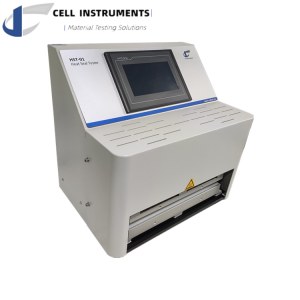Application
A heat sealer is a machine that employs heat to seal products, packaging, and thermoplastic materials. Heat sealing involves uniting thermoplastics through heat and pressure. Items like plastic bags and packaging are commonly shaped and sealed with heat sealers.
A Heat Seal Tester, designed for laboratory use, is a compact heat sealer. Its purpose is to assess the heat sealability of surfaces, sealant layers in films, laminates, polymers, and composites. Achieving effective seals involves three parameters: time, temperature, and pressure. The heat seal tester recreates the sealing process by controlling these parameters.
The strength of seals in flexible packaging serves as an indicator of both functional performance and ease of opening.
Standard
ASTM F2029-16(2021) : Standard Practices for Making Laboratory Heat Seals for Determination of Heat Sealability of Flexible Barrier Materials as Measured by Seal Strength.
Technical Features
The crucial aspects of a heat seal tester lie in its stability and precision concerning time, temperature, and pressure. The HST-01 heat seal tester guarantees excellent sealing outcomes through our cutting-edge design, emphasizing both stability and accuracy.
1.The unit is PLC controlled (industrial-level stability) and operated through an HMI touch screen.
2.Both the upper and lower components are constructed from aluminum and heated, ensuring minimal heat loss during sealing for consistent temperature.
3.A first-class P.I.D. temperature controller ensures precise temperature regulation and efficient heating.
4.Accurate timing combined with a proximity sensor enables synchronized seal initiation with jaw movement.
5.The sealing bar, guided in three directions, ensures uniform pressure.
6.User safety is prioritized with features like an anti-scald front cover, and tests can be manually initiated or via a foot switch.
7.Customizable seal jaws are available in terms of dimensions, shapes, and patterns.
8.The inclusion of an RS 232 COM Port and optional computer software offer additional functionalities. (optional)
Main Parameters
Sealing Temp. Ambient~300℃
Deviation ±0.2℃
Sealing Time 0.1S~9999S
Sealing Pressure 0.15~0.7 MPa
Seal Jaws 330*10 mm L*W
Gas Pressure 0.7 MPa
Port Size Ф6 mm PU Hose
Power AC 220V 50Hz
Test Process
Place a sample between two parallel heated sealing jaws with flat surfaces. When the required temperature reaches equilibrium, the upper seal jaw, driven by a gas cylinder, is pushed down to exert a certain pressure on the sample and remain for some time. When the preset sealing time ends, the upper sealing jaw returns to its original position and the whole heatsealability testing process finishes.
Heat Sealing Evaluation
The heatsealability can be further analyzed by seal continuity, typically measured by air-leak, dye , visual examination, microorganism or other technique.
Location : No. 5577 Gongyebei Rd, Licheng, 250109 Jinan,
Contact : Yang Yvette, +8618560733670








